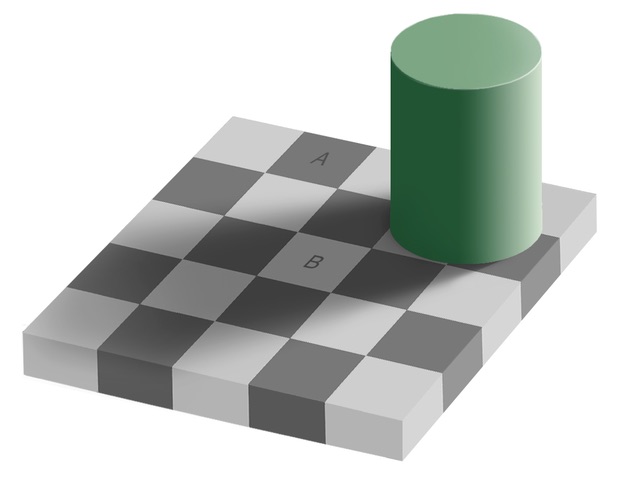“I want to start with a game, okay? And to win this game, all you have to do is see the reality in front of you as it really is.”
 So begins researcher Beau Lotto’s fascinating TED Talk (video below) wherein he demonstrates impressive optical illusions that challenge the nature of sensory perception and “reality.” The founder of Lotto Lab and the author of Why We See What We Do: An Empirical Theory of Vision
So begins researcher Beau Lotto’s fascinating TED Talk (video below) wherein he demonstrates impressive optical illusions that challenge the nature of sensory perception and “reality.” The founder of Lotto Lab and the author of Why We See What We Do: An Empirical Theory of Vision Lotto explores how our brain synthesizes perceptions that are far more contextual and much less objective than we realize.
“Context is everything.”
“Seeing color is one of the simplest things the brain does,” says Lotto, “yet even at this most fundamental level context is everything.” Why? Because we need the sensory input we receive from ‘out there’ to be useful. In the case of color, retinal information alone is not enough. Lotto explains, “The light that falls on your eye, retinal information, is meaningless because it could mean literally anything.”
Ca y u rea t is?
W at ar ou rea in ?
Most of us can ‘read’ these sentences because our brains didn’t evolve to interpret the world the way it actually is. “Significance develops by interacting with the world,” says Lotto. “The brain evolves the way it was useful to see in the past… and how we see is by continually re-defining normality.”
“Our brains didn’t evolve to interpret the world the way it actually is.”
In other words, our brains are adept at filling in the gaps in order to maintain a consistent framework so we can better navigate the world. Lotto says we continually re-define normality. We would like to think he means that we re-define normality in relationship to the sensory input of the present – in other words, objectively. Yet since our early experiences are what our brains use to develop context, it’s easy to imagine how we may be limiting ourselves by unconsciously filtering out lots of information.
We assume our senses are delivering trustworthy information.
That’s great when we are driving down the street or about to walk off a cliff. But what about the emotional contexts we develop as children which we then continue to assume are true into adulthood? How can we avoid re-defining the normality of the present through the limiting lens of the past? While much of Lotto Lab’s research is devoted to understanding the mechanism of seeing, there is also this company statement on the website to consider:
“The brain tells itself stories, and it’s these stories that are our perceptual and conceptual truths of the world that guide our behaviour. Here our aim is to understand the principles by which the human brain encodes the meaning of sensory relationships that were previously useful.”
Beau Lotto ends his talk by stating, “Only through uncertainty is there a potential for understanding.” He is running out of time and doesn’t explain fully what he means. Yet having just experienced the ease with which he has challenged our sensory relationship with the world, it’s clear to the audience that, when it comes to the act of seeing, we are living in an illusion of the senses. There is a paradox at work here. As uncomfortable as it may be, we sometimes have to let go of what we ‘know’ in order to perceive something new.
“There’s no inherent meaning in information… it’s what we do with that information that matters.”
So if your brain is telling you a story that isn’t yielding a context for well-being, it might just be an illusion you don’t have to believe.
“Only through uncertainty is there a potential for understanding.”
“There’s no inherent meaning in information… it’s what we do with that information that matters.”
This was HUGE revelation for me which I did not even have until about 5 years ago. It is the basis for me to have lots of compassion for others because their truth, their right and wrong, their reality depends on their perceptions. We all really do live in our own creation of reality.
Great article! I’m gonna check out this TED talk.